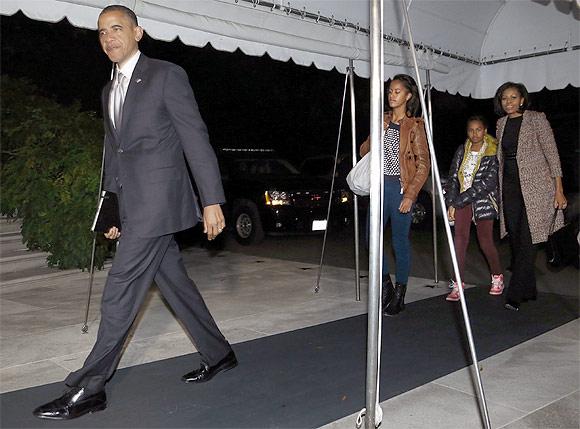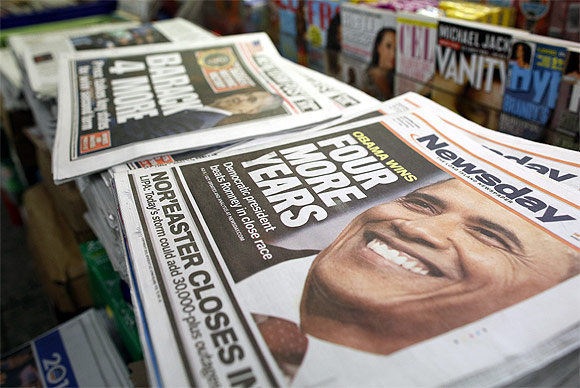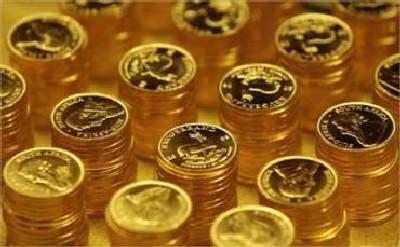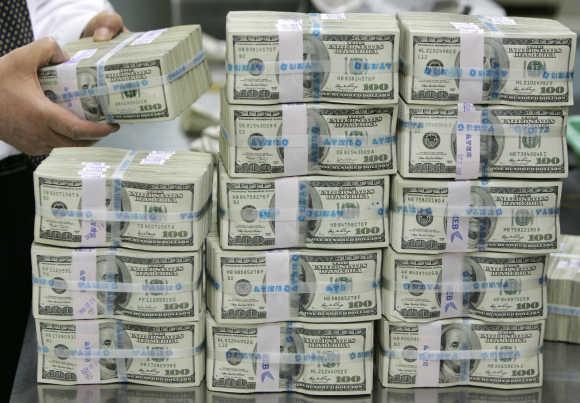 | « Back to article | Print this article |
Commodity prices rise on Obama's victory
Barack Obama's re-election as the President of the United States has proved favourable for commodities markets amid hope that the recently announced third round of quantitative easing (QE3) for brining liquidity into the financial system would continue in future as well.
Prices of non-agri commodities started moving upwards since Monday afternoon when opinion polls in the US showed Obama's possible win.
Click NEXT to read more...
Commodity prices rise on Obama's victory
Since then, prices of base metals, led by copper, shot up by two per cent, while gold hit a two-week high of $1,729 an oz.
Obama's win against Mitt Romney assumes significance as the stimulus package announced by the US President is estimated to continue to bring more investible money into the hands of common people, thereby increasing their purchasing power.
President Obama had announced $40-billion bond purchases per month to support the dwindling American economy.
Click NEXT to read more...
Commodity prices rise on Obama's victory
"More than Obama's return to power, Mitt Romney's announcement at a public meeting of removing Ben Bernanke as the Federal Reserve chairman not coming true has come as relief. Removing Bernanke would have meant discontinuing the ongoing economic programme in the US. That would have proved risky for the country," said Gnanasekar Thiagarajan, director, Commtrendz Research, a Mumbai-based commodity research firm.
The Federal Open Market Committee had on October 24 affirmed plans to buy $40 billion of mortgage-backed securities each month without specifying the total size or duration of the purchases.
Click NEXT to read more...
Commodity prices rise on Obama's victory
In the two previous rounds of bond-buying, the Fed had bought $2.3 trillion in securities and swapped short-term Treasuries with longer-term securities in a programme called Operation Twist.
The Obama victory had reinstated the prospects of a continued stimulus in the world's biggest economy, said an economist.
Spot gold gained as much as 0.7 per cent to $1,727.55 an oz and was at $1,727.05 in early afternoon trade in Singapore.
Click NEXT to read more...
Commodity prices rise on Obama's victory
Copper rose as much as 1.3 per cent to $7,798 a tonne in London, and was at $7,780 a tonne. West Texas Intermediate oil for December delivery pared losses of as much as one per cent and the Standard & Poor's GSCI Index of raw materials climbed 0.2 per cent to 645.56.
The Dollar Index, a gauge of the US currency against six counterparts, traded 0.4 percent lower at 80.293. Commodities priced in dollars tend to move up when the currency falls.
WTI oil for December delivery was at $88.56 a barrel, down 15 cents, on the New York Mercantile Exchange after dropping as much as 84 cents.
Click NEXT to read more...
Commodity prices rise on Obama's victory
Nickel, lead, aluminum, zinc and tin advanced on the London Metal Exchange, while rubber rallied as much as 2.4 percent on the Tokyo Commodity Exchange.
"Commodity prices would tend to behave differentially. Gold would tend to gain as the dollar weakens, while metal prices will tend to dip if the US economy weakens any further on account of fiscal austerity. A slowdown in the US will affect our exports as well as foreign investment flows and, hence, stability in this economic geography is necessary. Also, the rupee will continue to be pressurd, based on the dollar-euro relation, though the main guiding force would still be fundamentals. Developments here need to be monitored constantly," said Madan Sabnavis, chief economist, Care Ratings.






